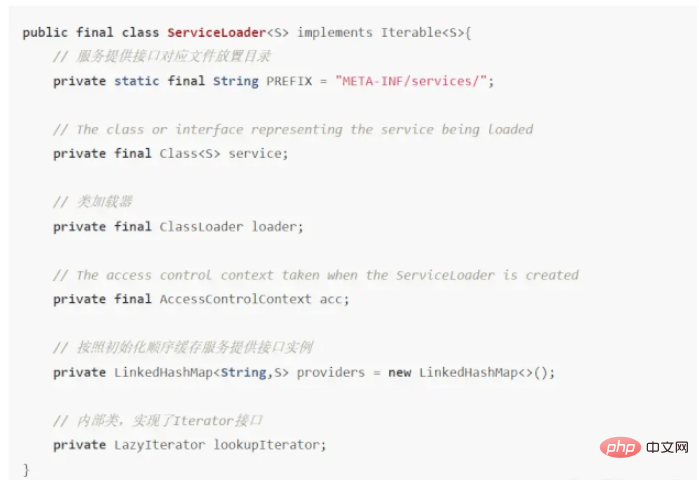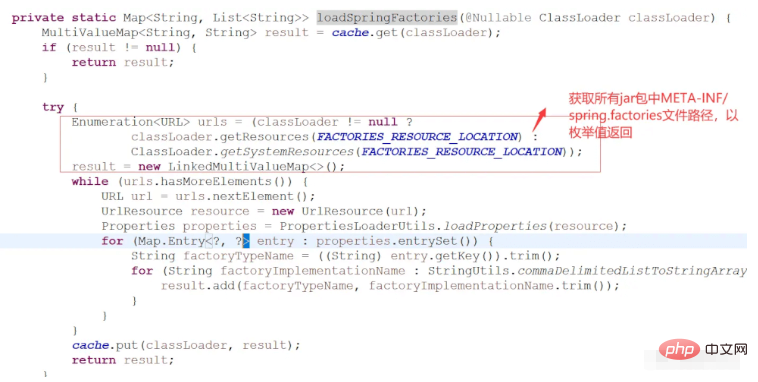How to implement SpringBoot's SPI mechanism
Introduction
SPI (Service Provider Interface) is a service discovery mechanism built into JDK, which can be used to enable framework extensions and replacement components. Mainly For development in frameworks, such as Dubbo, Spring, Common-Logging, JDBC, etc., the SPI mechanism is used to provide different implementations for the same interface to different users, thus improving the scalability of the framework.
Java SPI implementation
Java's built-in SPI uses the java.util.ServiceLoader class to parse files named with the fully qualified name of the interface in the classPath and META-INF/services/ directories of the jar package. And load the interface implementation class specified in the file to complete the call.
Example description
Create a dynamic interface
public interface VedioSPI
{
void call();
}Implementation class 1
public class Mp3Vedio implements VedioSPI
{
@Override
public void call()
{
System.out.println("this is mp3 call");
}
}Implementation class 2
public class Mp4Vedio implements VedioSPI
{
@Override
public void call()
{
System.out.println("this is mp4 call");
}
}In the source directory of the project Create the com.skywares.fw.juc.spi.VedioSPI file in the new META-INF/services/ directory.

Related tests
public class VedioSPITest
{
public static void main(String[] args)
{
ServiceLoader<VedioSPI> serviceLoader =ServiceLoader.load(VedioSPI.class);
serviceLoader.forEach(t->{
t.call();
});
}
}Description: Java implements spi through ServiceLoader to find the tool classes provided by the service.
Running results

Source code analysis
The above is just a simple example to implement the built-in SPI function of java. The implementation principle is that ServiceLoader is a built-in Java tool class for finding service providing interfaces. It searches for service providing interfaces by calling the load() method, and finally traverses to access the implementation classes of the service providing interfaces one by one.

It can be found from the source code:
The ServiceLoader class itself implements the Iterable interface and implements the iterator method in it. The iterator method The method in the internal class LazyIterator is called in the implementation. After parsing the service provider interface file, the final result is placed in the Iterator and returned. Direct access to the service provider interface implementation class is not supported.
The corresponding files for all service provider interfaces are placed in the META-INF/services/ directory. The final type determines that the PREFIX directory cannot be changed.
Although the idea of the SPI mechanism provided by java is very good, it also has corresponding disadvantages. The details are as follows:
Java’s built-in methods can only be obtained through traversal
The service provider interface must be placed in META-INF/services/ Under contents.
In view of the problems existing in java's SPI, Spring's SPI mechanism follows the idea of SPI, but expands and optimizes it.
Spring SPI
Spring SPI follows the design idea of Java SPI. Spring uses the spring.factories method to implement the SPI mechanism, which can provide the Spring framework without modifying the Spring source code. Scalability.
Spring example
Definition interface
public interface DataBaseSPI
{
void getConnection();
}Related implementation
#DB2实现
public class DB2DataBase implements DataBaseSPI
{
@Override
public void getConnection()
{
System.out.println("this database is db2");
}
}
#Mysql实现
public class MysqlDataBase implements DataBaseSPI
{
@Override
public void getConnection()
{
System.out.println("this is mysql database");
}
}1. In the META-INF directory of the project, add the spring.factories file

2. Fill in the relevant interface information, the content is as follows
com.skywares.fw.juc.springspi.DataBaseSPI = com.skywares.fw .juc.springspi.DB2DataBase, com.skywares.fw.juc.springspi.MysqlDataBase
Description Multiple implementations are separated by commas.
Related test class
public class SpringSPITest
{
public static void main(String[] args)
{
List<DataBaseSPI> dataBaseSPIs =SpringFactoriesLoader.loadFactories(DataBaseSPI.class,
Thread.currentThread().getContextClassLoader());
for(DataBaseSPI datBaseSPI:dataBaseSPIs){
datBaseSPI.getConnection();
}
}
}Output results

We can see from the example that Spring uses spring.factories to implement SPI and java implementation SPI is very similar, but the relevant optimization of spring's spi method for java's spi is as follows:
Java SPI is a service providing interface corresponding to a configuration file, and the configuration file stores the current All implementation classes of the interface, multiple service provider interfaces correspond to multiple configuration files, all configurations are in the services directory;
Spring factories SPI is a spring.factories configuration file that stores multiple The interface and corresponding implementation class are configured with the fully qualified name of the interface as the key and the implementation class as the value. Multiple implementation classes are separated by commas. There is only one configuration file, spring.factories.
So how does spring implement SpI by loading spring.factories? We can further analyze through the source code.
Source code analysis

Description: loadFactoryNames parses the fully qualified name of the implementation class of the specified interface in the spring.factories file. The specific implementation is as follows:

Description: Get the file path of META-INF/spring.factories in all jar packages and return it as an enumeration value. Traverse the spring.factories file path, load and parse one by one, integrate the implementation class name of the factoryClass type, obtain the full class name of the implementation class, and then perform the instance operation of the class. The relevant source code is as follows:

Note: Instantiation implements corresponding initialization through reflection.
The above is the detailed content of How to implement SpringBoot's SPI mechanism. For more information, please follow other related articles on the PHP Chinese website!

Hot AI Tools

Undresser.AI Undress
AI-powered app for creating realistic nude photos

AI Clothes Remover
Online AI tool for removing clothes from photos.

Undress AI Tool
Undress images for free

Clothoff.io
AI clothes remover

AI Hentai Generator
Generate AI Hentai for free.

Hot Article

Hot Tools

Notepad++7.3.1
Easy-to-use and free code editor

SublimeText3 Chinese version
Chinese version, very easy to use

Zend Studio 13.0.1
Powerful PHP integrated development environment

Dreamweaver CS6
Visual web development tools

SublimeText3 Mac version
God-level code editing software (SublimeText3)

Hot Topics
 How Springboot integrates Jasypt to implement configuration file encryption
Jun 01, 2023 am 08:55 AM
How Springboot integrates Jasypt to implement configuration file encryption
Jun 01, 2023 am 08:55 AM
Introduction to Jasypt Jasypt is a java library that allows a developer to add basic encryption functionality to his/her project with minimal effort and does not require a deep understanding of how encryption works. High security for one-way and two-way encryption. , standards-based encryption technology. Encrypt passwords, text, numbers, binaries... Suitable for integration into Spring-based applications, open API, for use with any JCE provider... Add the following dependency: com.github.ulisesbocchiojasypt-spring-boot-starter2. 1.1Jasypt benefits protect our system security. Even if the code is leaked, the data source can be guaranteed.
 How to use Redis to implement distributed locks in SpringBoot
Jun 03, 2023 am 08:16 AM
How to use Redis to implement distributed locks in SpringBoot
Jun 03, 2023 am 08:16 AM
1. Redis implements distributed lock principle and why distributed locks are needed. Before talking about distributed locks, it is necessary to explain why distributed locks are needed. The opposite of distributed locks is stand-alone locks. When we write multi-threaded programs, we avoid data problems caused by operating a shared variable at the same time. We usually use a lock to mutually exclude the shared variables to ensure the correctness of the shared variables. Its scope of use is in the same process. If there are multiple processes that need to operate a shared resource at the same time, how can they be mutually exclusive? Today's business applications are usually microservice architecture, which also means that one application will deploy multiple processes. If multiple processes need to modify the same row of records in MySQL, in order to avoid dirty data caused by out-of-order operations, distribution needs to be introduced at this time. The style is locked. Want to achieve points
 How SpringBoot integrates Redisson to implement delay queue
May 30, 2023 pm 02:40 PM
How SpringBoot integrates Redisson to implement delay queue
May 30, 2023 pm 02:40 PM
Usage scenario 1. The order was placed successfully but the payment was not made within 30 minutes. The payment timed out and the order was automatically canceled. 2. The order was signed and no evaluation was conducted for 7 days after signing. If the order times out and is not evaluated, the system defaults to a positive rating. 3. The order is placed successfully. If the merchant does not receive the order for 5 minutes, the order is cancelled. 4. The delivery times out, and push SMS reminder... For scenarios with long delays and low real-time performance, we can Use task scheduling to perform regular polling processing. For example: xxl-job Today we will pick
 How to solve the problem that springboot cannot access the file after reading it into a jar package
Jun 03, 2023 pm 04:38 PM
How to solve the problem that springboot cannot access the file after reading it into a jar package
Jun 03, 2023 pm 04:38 PM
Springboot reads the file, but cannot access the latest development after packaging it into a jar package. There is a situation where springboot cannot read the file after packaging it into a jar package. The reason is that after packaging, the virtual path of the file is invalid and can only be accessed through the stream. Read. The file is under resources publicvoidtest(){Listnames=newArrayList();InputStreamReaderread=null;try{ClassPathResourceresource=newClassPathResource("name.txt");Input
 Comparison and difference analysis between SpringBoot and SpringMVC
Dec 29, 2023 am 11:02 AM
Comparison and difference analysis between SpringBoot and SpringMVC
Dec 29, 2023 am 11:02 AM
SpringBoot and SpringMVC are both commonly used frameworks in Java development, but there are some obvious differences between them. This article will explore the features and uses of these two frameworks and compare their differences. First, let's learn about SpringBoot. SpringBoot was developed by the Pivotal team to simplify the creation and deployment of applications based on the Spring framework. It provides a fast, lightweight way to build stand-alone, executable
 How SpringBoot customizes Redis to implement cache serialization
Jun 03, 2023 am 11:32 AM
How SpringBoot customizes Redis to implement cache serialization
Jun 03, 2023 am 11:32 AM
1. Customize RedisTemplate1.1, RedisAPI default serialization mechanism. The API-based Redis cache implementation uses the RedisTemplate template for data caching operations. Here, open the RedisTemplate class and view the source code information of the class. publicclassRedisTemplateextendsRedisAccessorimplementsRedisOperations, BeanClassLoaderAware{//Declare key, Various serialization methods of value, the initial value is empty @NullableprivateRedisSe
 How to implement Springboot+Mybatis-plus without using SQL statements to add multiple tables
Jun 02, 2023 am 11:07 AM
How to implement Springboot+Mybatis-plus without using SQL statements to add multiple tables
Jun 02, 2023 am 11:07 AM
When Springboot+Mybatis-plus does not use SQL statements to perform multi-table adding operations, the problems I encountered are decomposed by simulating thinking in the test environment: Create a BrandDTO object with parameters to simulate passing parameters to the background. We all know that it is extremely difficult to perform multi-table operations in Mybatis-plus. If you do not use tools such as Mybatis-plus-join, you can only configure the corresponding Mapper.xml file and configure The smelly and long ResultMap, and then write the corresponding sql statement. Although this method seems cumbersome, it is highly flexible and allows us to
 How to get the value in application.yml in springboot
Jun 03, 2023 pm 06:43 PM
How to get the value in application.yml in springboot
Jun 03, 2023 pm 06:43 PM
In projects, some configuration information is often needed. This information may have different configurations in the test environment and the production environment, and may need to be modified later based on actual business conditions. We cannot hard-code these configurations in the code. It is best to write them in the configuration file. For example, you can write this information in the application.yml file. So, how to get or use this address in the code? There are 2 methods. Method 1: We can get the value corresponding to the key in the configuration file (application.yml) through the ${key} annotated with @Value. This method is suitable for situations where there are relatively few microservices. Method 2: In actual projects, When business is complicated, logic






